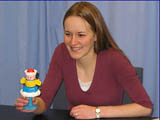
Dr. Repacholi is a developmental psychologist and an Associate Professor in the UW Department of Psychology. She received a Master's degree in Clinical Psychology from the University of Western Australia, and a Ph. D. from the University of California-Berkeley. She has a broad interest in children's early social-cognitive and social-emotional development. Her most recent research centers on infants' responsiveness to, and understanding of, other people's emotional states. She has also published research papers on topics including theory of mind, attachment, children's gender-typed beliefs and behavior, and the ontogeny of human disgust responses.
Ph.D., University of California-Berkeley
(Developmental Psychology, 1996)
Predoctoral Fellow, University of California-Berkeley, National Institute of Mental Health Training Grant in Emotion Research (1993-94)
Master of Clinical Psychology, University of Western Australia, Perth, Australia (1986)
Bachelor of Psychology, University of Western Australia (1984)
Associate Professor, 2007-present
University of Washington, Department of Psychology
Assistant Professor, 2002-2006
University of Washington, Department of Psychology
Research Associate, 2001-2002
University of Washington Institute for Learning and Brain Sciences, Seattle, WA
Lecturer (tenured), 1998-2001
Department of Psychology, Macquarie University, Sydney, Australia
Associate Lecturer, 1997
Department of Educational Psychology, Measurement & Technology, University of Sydney, Australia
Editorial Consultant, Child Development (1998, 1999)
Grant Proposal Reviewer, Australian universities and the Australian Research Council
Occasional Reviewer, Child Development, Developmental Psychology, British Journal of Developmental Psychology, Social Development, Developmental Science, Mind and Lanuage
Conference Organizer, in collaboration with Dr. V. Slaughter, international mini-conference on theory of mind and social functioning, Macquarie University, July, 2001, funded by the Macquarie Centre for Cognitive Sciences (MACCS)
Ruba, A., Meltzoff, A., & Repacholi, B. (2020b). The development of negative event-emotion matching in infancy: Implications for theories in affective science. Affective Science, 1, 4-19. Click here to receive a reprint
Ruba, A., Meltzoff, A., & Repacholi, B. (2020a). Superordinate categorization of negative facial expressions in infancy: The influence of labels. Developmental Psychology, 56, 671-685. Click here to receive a reprint
Ruba, A. & Repacholi, B. (2019). Do preverbal infants understand discrete facial expressions of emotion? Emotion Review. Advance online publication. Click here to receive a reprint
Ruba, A., Meltzoff, A., & Repacholi, B. (2019). How do you feel? Preverbal infants match negative emotions to events. Developmental Psychology, 55, 1138-1149. Click here to receive a reprint
Repacholi, B., Meltzoff, A., Toub, T., & Ruba, A. (2016). Infants’ generalizations about other people’s emotions: Foundations for trait-like attributions. Developmental Psychology, 52, 364-378. Click here to receive a reprint
Repacholi, B., Meltzoff, A., Hennings, T., & Ruba, A. (2016). Transfer of social learning across contexts: exploring infants’ attribution of trait‐like emotions to adults. Infancy, 21, 785-806. Click here to receive a reprint
Repacholi, B., Meltzoff, A., Rowe, H., & Toub, T. (2014). Infant, control thyself: Infants’ integration of multiple social cues to regulate their imitative behavior. Cognitive Development, 32, 46-57. Click here to receive a reprint
Oaten, M., Stevenson, R., Wagland, P., Case, T., & Repacholi, B. (2014). Parent-child transmission of disgust and hand hygiene: The role of vocalizations, gestures and other parental responses. The Psychological Record, 64(4), 803-811. Click here to receive a reprint
Stevenson, R., Oaten, M., Case, T., & Repacholi, B. (2014). Is disgust prepared? A preliminary examination in young children. The Journal of General Psychology, 141(4), 326-347. Click here to receive a reprint
Stevenson, R.J., Oaten, M.J., Case, T.I., Repacholi, B.M., & Wagland, P. (2010). Children’s response to adult disgust elicitors: Development and acquisition. Developmental Psychology, 46, 165-177.
Repacholi, B.M. (2009). Linking actions and emotions: Evidence from 15- and 18-month-old infants. British Journal of Developmental Psychology, 27, 649-667.
Repacholi, B.M., Meltzoff, A.N., & Olsen, B. (2008). Infants’ understanding of the link between visual perception and emotion: “If she can’t see me doing it, she won’t get angry”. Developmental Psychology, 44, 561-574.
Toub, T., & Repacholi, B.M. (2007). Infants’ response to indirect emotional information: the role of the emotional referent. Published abstracts of the 5th biennial meeting of the Cognitive Development Society, Santa Fe, USA, October.
Repacholi, B.M., & Meltzoff, A.N. (2007). Emotional eavesdropping: Infants selectively respond to indirect emotional signals. Child Development, 78, 503-521.
Case, T.I., Repacholi, B.M., & Stevenson, R.J. (2006). My baby doesn’t smell as bad as yours: The plasticity of disgust. Evolution and Human Behavior, 27, 357-365.
Stevenson, R., & Repacholi, B. (2005). Does the source of an interpersonal odour affect disgust? A disease risk model and its alternatives. European Journal of Social Psychology, 35, 375-401.
Stevenson, R., & Repacholi, B. (2005). Does the source of an interpersonal odour affect disgust? A disease risk mdel and it's alternatives. European Journal of Social Psychology, 35, 375-401.
Repacholi, B., & Trapolini, T. (2004). Attahment and preschool children's understanding of maternal versus non-maternal psychological states. British Journal of Developmental Psychology, 22, 395-416.
Stevenson, R., & Repacholi, B. (2003). Age-related changes in children's hedonic response to male body odor. Developmental Psychology, 39, 670-679.
Repacholi, B., & Slaughter, V. (Eds.). (2003). Individual differences in theory of mind: Implications for typical and atypical development. Hove, UK: Psychology Press.
Repacholi, B., Slaughter, V., Pritchard, M., & Gibbs, V. (2003). Theory of mind, Machiavellianism, and social functioning in childhood (pp. 67-98). In B. Repacholi & V. Slaughter (Eds.) Individual differences in theory of mind: Implications for typical and atypical development. Hove, UK: Psychology Press.
Slaughter, V., & Repacholi, B. (2003). Individual differences in theory of mind: what are we investigating? (pp. 1-12). In B. Repacholi & V. Slaughter (Eds.) Individual differences in theory of mind: Implications for typical and atypical development. Hove, UK: Psychology Press.
Pickering, S., & Repacholi, B. (2002). Modifying children's gender-typed musical instrument preferences: The effects of gender and age. Sex Roles, 45, 623-643.
Meltzoff, A., Gopnik, A., & Repacholi, B. (1999). Toddlers' understanding of intentions, desires and emotions: Explorations of the dark ages. In P. Zelazo, J. Astington, & D. Olson (Eds.), Developing theories of intention: Social understanding and self-control (pp. 17-41). Mahwah, NJ: Erlbaum.
Repacholi, B. M. (1998). Infants' use of attentional cues to identify the referent of another person's emotional expression. Developmental Psychology, 34, 1017-1025.
Repacholi, B. M., & Gopnik, A. (1997). Early reasoning about desires: Evidence from 14- and 18-month-olds. Developmental Psychology, 33, 12-21.
Watson, J. S., Umansky, R., Marcy, S., Johnston, C., & Repacholi, B. (1996). Behavioral competition in a case of Rett syndrome. Journal of Applied Developmental Psychology, 17, 553-575.
Watson, J. S., Umansky, R., Marcy, S., & Repacholi, B. (1996). Intention and preference in a 3-year-old girl with Rett Syndrome. Journal of Applied Developmental Psychology, 17, 69-84.
Lyons-Ruth, K., Alpern, L., & Repacholi, B. (1993). Disorganized infant attachment classification and maternal psychosocial problems as predictors of hostile-aggressive behavior in the preschool classroom. Child Development, 64, 572-585.
Lyons-Ruth, K., Repacholi, B., McLeod, S., & Silva, E. (1991). Disorganized attachment behavior in infancy: Short-term stability, maternal and infant correlates and risk-related sub-types. Development and Psychopathology, 3, 207-266.
The Baby Human (2003). Discovery Health Channel.
Media coverage in 2002 regarding publication about children's gender-typed musical instrument preferences: Reuters Health, BBC World Service, National Public Radio (KUOW - local affiliate), The Sunday Times, Sunday Telegraph (both UK) and Child magazine.
Life matters. (2000, May 2). Washington, DC: National Public Radio [Radio broadcast].
Kiddy thinks. (2000, February 3-9). Guardian Weekly, p. 24.
Baby steps. Do our first three years of life determine how we'll turn out? (2000, January 10). The New Yorker, pp. 80-87.
Go on then, have the broccoli if you must. (1997, February 22). New Scientist, p. 18.
2005
Repacholi, B., & Meltzoff, A. N. Other people's perceptual and emotional states influence infant imitation. Symposium presentation at the biennial meeting of the Society for Research in Child Development, Atlanta, USA, April.
Repacholi, B., & Meltzoff, A. N. The effect of attentional and indirect emotional cues on infants' actions. Poster presentation at a mini-conference on New Approaches to Infant Learning and Cognition, Duke University, USA, May.
2003
Repacholi, B., & Trapolini, T. Individual differences in preschool children's social understanding. Paper presented at the XI European Conference on Developmental Psychology, Milan, Italy, August.
2002
Repacholi, B. (2002, August). Infants' use of emotional signals to regulate object-directed behavior. Symposium on Affective and Linguistic Meaning from infancy through early childhood conducted at the biennial meeting of the International Society for the Study of Behavioral Development, Ottawa, Canada.
Repacholi, B., & Slaughter, V. (2002, April). Autistic children's responses to other people's emotional signals. Paper presented at the International Conference on Infant Studies, Toronto, Canada.
2001
Repacholi, B., & Slaughter, V. (2001, July). Theory of mind, Machiavellianism, and peer relationships in childhood. Paper presented at the Macquarie Centre for Cognitive Science (MACCS) workshop: Mind-reading and behaviour: Individual differences in theory of mind and implications for social functioning, Sydney, Australia.
Repacholi, B. (2001, April). Do emotional signals influence infant imitation? Poster session presented at the biennial meeting of the Society for Research in Child Development, Minneapolis, MN.
2000
Repacholi, B. (2000, November). Can infants learn anything from emotional signals? Lecture presented as part of the Social-Developmental Seminar Series, Department of Psychology, Macquarie University, Sydney, Australia.
Slaughter, V., & Repacholi, B. (2000, July). Autistic children's understanding of emotion. Invited talk given at the Institute of Psychiatry, University College, London, England.
1999
Repacholi, B. (1999, August). Infants' responses to other people's emotional expressions: Mindful or mindless? Invited talk given at the Australian Research Council workshop: Empathy, ethics and emotion. The Australian National University, Canberra, Australia.
Cuming, S., & Repacholi, B. (1999, July). Is there a link between children's peer relationships and their theory of mind? Poster session presented at the 11th Australasian Human Development Association Conference, Sydney, Australia.
Pickering, S., & Repacholi, B. (1999, April). The effects of musician gender on children's musical instrument preferences. Poster session presented at the biennial meeting of the Society for Research in Child Development, Albuquerque, NM.
Repacholi, B. (1999, January). The emergence of joint attention and social referencing: Developmental precursors to a theory of mind? Invited talk given at the Cognitive Science Colloquia, Macquarie University, Sydney, Australia.
1997
Pickering, S. & Repacholi, B. M. (1997, December). The effect of gender role models on children's musical instrument preferences. Paper presented at the annual conference of the Australian Association for Research in Education, Brisbane, Australia.
Repacholi, B. (1997, October). Beyond social referencing: New insights into emotion understanding in late infancy. Invited talk given at the Department of Psychology, University of Queensland, Brisbane, Australia.
Repacholi, B. M. (1997, April). Infants' understanding of the referential nature of emotions. Poster session presented at the biennial meeting of the Society for Research in Child Development, Washington, D.C.
1995
Repacholi, B. M. (1995, June). Components of children's early emotion understanding. Poster session presented at the annual workshop of the National Institute of Mental Health Postdoctoral Training Program on Emotion Research, Berkeley, CA.
Repacholi, B. M. (1995, April). Understanding the link between emotions and desires: Evidence from 18-month-old children. Poster session presented at the biennial meeting of the Society for Research in Child Development, Indianapolis, IN.
1991
Lyons-Ruth, K., Repacholi, B., Alpern, L., & Connell, D. (1991, April). Disorganized attachment behavior in infancy: Short-term stability, maternal correlates and the prediction of aggression in kindergarten. Symposium conducted at the Biennial meeting of the Society for Research in Child Development, Seattle, WA.
Contact Information
Phone: 206-616-6210
Email: [email protected] Website: http://depts.washington.edu/babylab/wordpress/
Betty Repacholi heads the Social and Emotional Development Lab (SEDL). SEDL research is concerned with infants' responses to other people's emotional signals and determining what they understand about these communications. In addition, Dr. Repacholi’s research interests include the relationship between theory of mind and children's social functioning; the effects of early social experience (e.g., attachment) on children's social-cognitive and emotional development; and the ontogeny of human disgust responses.
 Ashley Ruba
Ashley Ruba
Ashley Ruba is a third year Ph.D. student in Developmental Psychology. Ashley first discovered infant research in a language development lab at Duke University. Her honors thesis was an interdisciplinary project that examined how infants learned labels for emotional expressions. This study inspired Ashley to continue research as a lab manager at Duke before coming to UW. Specifically, Ashley’s research interests explore how emotion understanding develops throughout infancy and how various factors (e.g., language) might influence this process. The primary goal of her research is to bridge gaps between affective science and developmental psychology.
Former Grad Students
 Theresa Hennings
Theresa Hennings
Theresa Hennings received her masters degree in 2015. Theresa earned her Bachelor’s in Psychology from Lewis & Clark College, where she worked as a research assistant in a study looking at preschoolers’ understanding of other people’s emotions. After college, she continued child development research in a language and cognition lab at Stanford University. At UW, Theresa examined how infants’ understanding of other people’s emotions influences their behavior, social interactions, and trait attributions. Her research focused on how infants use information about other people’s emotional dispositions to make social evaluations.
 Berit Olsen
Berit Olsen
Berit Olsen received her doctorate degree in 2012. Berit earned her bachelor’s degree in Psychology and Religion from Pacific Lutheran University. After graduating, she spent a year in Norway studying the Norwegian paternity leave system on a Fulbright Grant. Her interests center on emotional development in very young children. In graduate school, Berit and Dr. Repacholi collaborated with Dr. Andrew Meltzoff to examine children’s understanding of the emotional content of adult’s behavior, and how that content affects children’s imitative learning.
 Tamara Spiewak Toub
Tamara Spiewak Toub
Tamara Spiewak Toub received her doctorate degree in 2012. Tamara pursued two lines of research while in graduate school. The first line of work focused on infants’ understanding of other people’s emotions and how these emotions influence infants’ behavior. In her second line of work, Tamara examined possible developmental benefits of pretend play. Her dissertation research examined the relation between pretend play and executive function (e.g., self-control) in preschoolers. Prior to coming to I-LABS, Tamara earned her Bachelor’s degree in Psychology at Harvard University, and then worked in NYC as a research assistant.